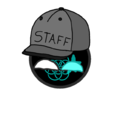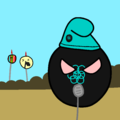Fictional Nationalism is a ![]() syncretic ideology that finds its foundation in the conception of forging imaginary nations, whether in the realm of video games (
syncretic ideology that finds its foundation in the conception of forging imaginary nations, whether in the realm of video games (![]() United Federation,
United Federation, ![]() Arstotzka in Papers, Please), literature (
Arstotzka in Papers, Please), literature (![]() Eastasia,
Eastasia, ![]() Eurasia,
Eurasia, ![]() Oceania in 1984), a Discord server, or other platforms. This movement embraces the creation of national identities that transcend physical borders, rooting themselves in virtual or narrative environments. Its essence lies in the collective construction of narratives, symbols, and traditions that define these fictional nations, thereby contributing to cohesion and a sense of belonging in communities not bound by real geographical locations. In
Oceania in 1984), a Discord server, or other platforms. This movement embraces the creation of national identities that transcend physical borders, rooting themselves in virtual or narrative environments. Its essence lies in the collective construction of narratives, symbols, and traditions that define these fictional nations, thereby contributing to cohesion and a sense of belonging in communities not bound by real geographical locations. In ![]() Fictional Nationalism, creativity and active participation in the construction of imaginary worlds are fundamental pillars, serving as a vehicle for individual expression and the formation of social bonds in the context of the unreal.
Fictional Nationalism, creativity and active participation in the construction of imaginary worlds are fundamental pillars, serving as a vehicle for individual expression and the formation of social bonds in the context of the unreal.
History on Discord
The history of ![]() Fictional Nationalism on
Fictional Nationalism on ![]() Discord has its origins in the Discord server called "Fictional Nations," which emerged as a dissident faction from the server called Terramagna, where the administrators abused their power. Therefore, "Fictional Nations" arose first, and
Discord has its origins in the Discord server called "Fictional Nations," which emerged as a dissident faction from the server called Terramagna, where the administrators abused their power. Therefore, "Fictional Nations" arose first, and ![]() DrasThe and
DrasThe and ![]() Anthony Bax were banned from that server. Subsequently, another server called
Anthony Bax were banned from that server. Subsequently, another server called ![]() "Micronaciones y Ficticios" emerged, where
"Micronaciones y Ficticios" emerged, where ![]()
![]() administrators
administrators ![]()
![]() engage in corruption, abuse of power, and insult their members.
engage in corruption, abuse of power, and insult their members.
Beliefs
At the heart of this ideology lies the conviction that the creation and development of imaginary nations constitute a valuable expression of human creativity. These ![]()
![]()
![]()
![]() fictional entities are not limited by geographical or historical barriers, allowing adherents of
fictional entities are not limited by geographical or historical barriers, allowing adherents of ![]() Fictional Nationalism to explore the diversity of forms of government, cultures, and narratives without the constraints of tangible reality.
Fictional Nationalism to explore the diversity of forms of government, cultures, and narratives without the constraints of tangible reality.
In this context, collaboration is encouraged among those who share this vision, creating virtual communities where these fictional nations are collectively built and developed. Loyalty and a sense of belonging are forged around shared values and stories, establishing a deep emotional connection with these entities that exist solely in the realm of imagination.
![]() Fictional Nationalism embraces diversity of perspectives and enriches the human experience by providing a space where creativity and world-building are celebrated as legitimate forms of expression. In this framework, mutual respect and openness to new ideas are promoted, contributing to the ongoing expansion of the imaginative horizons of those who identify with this unique ideology.
Fictional Nationalism embraces diversity of perspectives and enriches the human experience by providing a space where creativity and world-building are celebrated as legitimate forms of expression. In this framework, mutual respect and openness to new ideas are promoted, contributing to the ongoing expansion of the imaginative horizons of those who identify with this unique ideology.
In the ![]() Fictional Nationalism, human creativity stands as the protagonist, unfolding its potential without geographical or historical restrictions. Virtual communities become the crucible where these imaginary nations come to life, woven together by the collaboration of like-minded minds.
Fictional Nationalism, human creativity stands as the protagonist, unfolding its potential without geographical or historical restrictions. Virtual communities become the crucible where these imaginary nations come to life, woven together by the collaboration of like-minded minds.
Under this banner, loyalty and a sense of belonging take root in shared values and stories, creating strong emotional bonds with entities that exist only in the realm of imagination. This peculiar form of nationalism embraces diversity, turning the collective construction of worlds into a legitimate and celebrated expression.
The essence of ![]() Fictional Nationalism lies in its ability to enrich the human experience, providing a space where creativity flourishes, and openness to new ideas becomes a fundamental pillar. In this unique ideological framework, mutual respect stands as a bastion, thus contributing to the ongoing expansion of the imaginative horizons of those who identify with this distinctive perspective.
Fictional Nationalism lies in its ability to enrich the human experience, providing a space where creativity flourishes, and openness to new ideas becomes a fundamental pillar. In this unique ideological framework, mutual respect stands as a bastion, thus contributing to the ongoing expansion of the imaginative horizons of those who identify with this distinctive perspective.
Examples
FPCB
 Federal Republic of Benvaska
Federal Republic of Benvaska
The ![]() Federal Republic of Benvaska is a fictional
Federal Republic of Benvaska is a fictional ![]() federal state created by the user
federal state created by the user ![]() Anthony Bax. It is a state based on the history of
Anthony Bax. It is a state based on the history of ![]() Chile's independence and the history of
Chile's independence and the history of ![]() France. It has a
France. It has a ![]() protectionist and
protectionist and ![]() nationalist economic system based on
nationalist economic system based on ![]() dirigisme.
dirigisme.

The ![]() Federal Republic of Benvaska currently has 5 political parties: the
Federal Republic of Benvaska currently has 5 political parties: the ![]() Federal Party, the
Federal Party, the ![]() Liberal Party, the
Liberal Party, the ![]() Popular Party, the
Popular Party, the ![]() Conservative Party, and the
Conservative Party, and the ![]() Christian Democratic Party. The leader of the
Christian Democratic Party. The leader of the ![]() Federal Republic of Benvaska is Enver Balmaceda Ríos, a character based on
Federal Republic of Benvaska is Enver Balmaceda Ríos, a character based on ![]() Manuel Bulnes Prieto.
Manuel Bulnes Prieto. ![]() Enver Balmaceda Ríos has been in power for one year and belongs to the
Enver Balmaceda Ríos has been in power for one year and belongs to the ![]() Federal Party, a
Federal Party, a ![]() protectionist, conservative progressive, and center-left to center-authoritarian party.
protectionist, conservative progressive, and center-left to center-authoritarian party.
The ![]() Federal Republic of Benvaska currently has a strong and
Federal Republic of Benvaska currently has a strong and ![]() authoritarian government, mainly because there are many supporters of the recently abolished
authoritarian government, mainly because there are many supporters of the recently abolished ![]() absolutist monarchy of
absolutist monarchy of ![]() Carlos Kenneth Chudwell. In the
Carlos Kenneth Chudwell. In the ![]() Federal Republic of Benvaska, the death penalty is allowed and is applied to traitors and others.
Federal Republic of Benvaska, the death penalty is allowed and is applied to traitors and others.
Since the monarchy was abolished, people have lived forty percent more securely because the police abuse authorized by the monarchy has been eliminated.[1]
Since the abolition of the Monarchy, the guillotine was established in the ![]() Federal Republic of Benvaska for all traitors to the homeland and corrupt individuals, such as Jordan G. Bebito, who was beheaded for high treason.
Federal Republic of Benvaska for all traitors to the homeland and corrupt individuals, such as Jordan G. Bebito, who was beheaded for high treason.
Since King ![]() Carlos Kenneth Chudwell was assassinated by revolutionaries,[2] a process of dechristianization began, leading to the demolition of statues dedicated to priests, monarchs, or clergy,[3] and statues depicting angels such as the Archangel Michael now wear a Phrygian cap and have been renamed “The Angels of the Revolution,” in reference to the 1796 revolution where
Carlos Kenneth Chudwell was assassinated by revolutionaries,[2] a process of dechristianization began, leading to the demolition of statues dedicated to priests, monarchs, or clergy,[3] and statues depicting angels such as the Archangel Michael now wear a Phrygian cap and have been renamed “The Angels of the Revolution,” in reference to the 1796 revolution where ![]() King Carlos Kenneth Chudwell was shot in the stomach.[4]
King Carlos Kenneth Chudwell was shot in the stomach.[4]
See also: User:Bak Bax/Federal Republic of Benvaska for more information.
 Munnechiæ
Munnechiæ
Munnechiæ is the fictional country of the user ⠀, or the ![]() leader of Munnechiæ. It stands as a remarkable embodiment of the best ideals, blending elements of noocracy, laissez-faire economics, metamodernism, and Christian principles. As a noocracy, Munnechiæ's governance is characterized by the rule of the most intellectually capable individuals, ensuring a system that prioritizes wisdom, knowledge, and rational decision-making. This emphasis on intellectual prowess fosters a society where expertise and meritocracy flourish, allowing for the optimal allocation of resources and policies that benefit the greater good.
leader of Munnechiæ. It stands as a remarkable embodiment of the best ideals, blending elements of noocracy, laissez-faire economics, metamodernism, and Christian principles. As a noocracy, Munnechiæ's governance is characterized by the rule of the most intellectually capable individuals, ensuring a system that prioritizes wisdom, knowledge, and rational decision-making. This emphasis on intellectual prowess fosters a society where expertise and meritocracy flourish, allowing for the optimal allocation of resources and policies that benefit the greater good.

Economically, Munnechiæ embraces the principles of laissez-faire, recognizing the power of free markets and limited government intervention to stimulate innovation, competition, and economic growth. This approach encourages entrepreneurship, fosters a vibrant business environment, and empowers individuals to pursue their economic aspirations, resulting in a society marked by prosperity, opportunity, and individual freedom.
Metamodernism, as an integral part of Munnechiæ's cultural fabric, infuses the nation with a unique philosophical perspective. It encourages a synthesis of postmodern skepticism and modernist ideals, promoting a nuanced understanding of the complexities inherent in contemporary issues. This metamodernist outlook fosters a blend of irony and sincerity, allowing for a critical examination of societal norms, while simultaneously embracing optimism and hope for a better future.
In addition to these philosophical underpinnings, Munnechiæ is a country that upholds Christian values as a moral and ethical compass. The teachings of Christianity guide the nation's ethical framework, emphasizing compassion, justice, and love for one's fellow citizens. This belief system promotes a society that cherishes human dignity, fosters empathy, and encourages individuals to contribute to the well-being of others.
 Radinia (and others)
Radinia (and others) 


Radinia and many other fictional nations are part of a fictional High Fantasy universe made by user ![]() Dr. Occo. He intends to make it into a series of books someday. The political heart of its story is supposed to be an exploration of oppressive systems and how the different characters work within them or break out of them. This is mostly explored through the hypercorporate „Guild of Pyromages, Weapon Mechanics and practicing Scientists“ (Guild of Pyromaniacs for short) and the multiple systems of governance fighting for dominance in its world.
Dr. Occo. He intends to make it into a series of books someday. The political heart of its story is supposed to be an exploration of oppressive systems and how the different characters work within them or break out of them. This is mostly explored through the hypercorporate „Guild of Pyromages, Weapon Mechanics and practicing Scientists“ (Guild of Pyromaniacs for short) and the multiple systems of governance fighting for dominance in its world.
Radinia is a nation currently suffering from a rather violent civil war, and only through extreme luck has escaped the fate of being carved up between its neighbours. The Radinian Civil War started when the ![]() Royal Army massacred a town for its etreme disobedience, and it ended multiple years later, after the last units of the RRA surrendered to Rebel groups and gangs. The King was killed in the war, when his palace was stormed by a demon, and after that the entire Royalty was massacred by a Socialist Insurgency group. Now, Radinia is a battleground for multiple smaller groups who want to establish a new government, some for their own local territories, some for the whole country.
Royal Army massacred a town for its etreme disobedience, and it ended multiple years later, after the last units of the RRA surrendered to Rebel groups and gangs. The King was killed in the war, when his palace was stormed by a demon, and after that the entire Royalty was massacred by a Socialist Insurgency group. Now, Radinia is a battleground for multiple smaller groups who want to establish a new government, some for their own local territories, some for the whole country.
Technologically, Radinia is nearing the level of tech that our world had in the first World War, though its equipments are a little different due to the presence of things like magic and Giant Trolls. Most research into Weapons technology specifically are made by the ![]() Pyromaniacs' Guild, a proto-corporate structure that evolved from the earlier Guild System present in Radinia. It currently has complete control over a mountain range in the north of Radinia, and uses its massive wealth to train new Guild Members in the Ashen Academy.
Pyromaniacs' Guild, a proto-corporate structure that evolved from the earlier Guild System present in Radinia. It currently has complete control over a mountain range in the north of Radinia, and uses its massive wealth to train new Guild Members in the Ashen Academy.
The mightiest groups squabbling for control of Radinia are the ![]() West Radinian Republican Army, the
West Radinian Republican Army, the ![]() Reginal Conspiracy, and the foreign funded
Reginal Conspiracy, and the foreign funded ![]() Second Radinian Legion. Most of Radinian Territory, though, is currently held by
Second Radinian Legion. Most of Radinian Territory, though, is currently held by ![]() gangs
gangs ![]() , warlords, and
, warlords, and ![]() Separatist Governments
Separatist Governments ![]() .
.
For more information: this here article.
 Discord
Discord
 Canadis
Canadis
![]() Canadis, initially known as the Colonial Empire of Canadis, was in its early years the number 1 power in terms of territory and weaponry. However, after some years, a significant event occurred: a revolution in the year 1753 led by a Cadian revolutionary movement, as the empire was not paying attention to the needs of the people. In the year 1755, the
Canadis, initially known as the Colonial Empire of Canadis, was in its early years the number 1 power in terms of territory and weaponry. However, after some years, a significant event occurred: a revolution in the year 1753 led by a Cadian revolutionary movement, as the empire was not paying attention to the needs of the people. In the year 1755, the ![]() Socialist Republic of Canadis was established, later changing its name to the Socialist Federative Republic of Canadis.
Socialist Republic of Canadis was established, later changing its name to the Socialist Federative Republic of Canadis.

Over the years, ![]() Canadis underwent numerous changes in leadership, including prominent figures like
Canadis underwent numerous changes in leadership, including prominent figures like ![]() Otto Dras, who founded the revolutionary party and established the
Otto Dras, who founded the revolutionary party and established the ![]() Federative Socialist Republic of Canadis. Currently, the country is under the leadership of a German president named
Federative Socialist Republic of Canadis. Currently, the country is under the leadership of a German president named ![]() Gregor Heinrich Bötel.
Gregor Heinrich Bötel.
![]() Canadis has had Drastic Changes in the Presidency, as first a Strasserist President, then a Nazbol one, then a Paetelist one and then a Strasserist one. As well as the King, who is a Capitalist-Monarch and was a Racist.
Canadis has had Drastic Changes in the Presidency, as first a Strasserist President, then a Nazbol one, then a Paetelist one and then a Strasserist one. As well as the King, who is a Capitalist-Monarch and was a Racist.
List of Presidents and Kings:
 Ziechreinh
Ziechreinh
Year 0: the ![]() Republic of Ziechreinh is founded on an island in the Iberian Peninsula. The founder of
Republic of Ziechreinh is founded on an island in the Iberian Peninsula. The founder of ![]() Ziechreinh is named Walter Rich Misder. It is established after gaining independence from the Holy Greco-Germanic Empire.
Ziechreinh is named Walter Rich Misder. It is established after gaining independence from the Holy Greco-Germanic Empire.
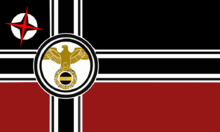
From its beginnings, ![]() Ziechreinh was a National Socialist country. Walter died years later after an illness. Then,
Ziechreinh was a National Socialist country. Walter died years later after an illness. Then, ![]() Hans Otto Stravins took over as President, beginning to improve the country, making significant advancements, and strengthening
Hans Otto Stravins took over as President, beginning to improve the country, making significant advancements, and strengthening ![]() Ziechreinh.
Ziechreinh. ![]() Hans Otto served for several years until the year 62, where he died of old age, leaving behind various secrets in
Hans Otto served for several years until the year 62, where he died of old age, leaving behind various secrets in ![]() Ziechreinh. In the year 63,
Ziechreinh. In the year 63, ![]() Strasser takes the position of President, and they discover a unique light yellow mineral in the world that would serve a purpose in the future.
Strasser takes the position of President, and they discover a unique light yellow mineral in the world that would serve a purpose in the future. ![]() Ziechreinh didn't remain just an island for long; in the year 14, it expanded further north, acquiring territories and spreading to all continents, establishing several colonies.
Ziechreinh didn't remain just an island for long; in the year 14, it expanded further north, acquiring territories and spreading to all continents, establishing several colonies.
Several years ago, in the year 3, there was a war called "The 103-Year War." This war was against Venezia, in which Ziechreinh joined a group of countries opposing them. The war was very bloody, but for the people of Venezia. It wasn't a significant war. The most important one was in the year 1 against a country now called Jorpolia. Before, Jorpolia was a Jewish country and wanted to join forces with other countries to wage war against everyone. Ziechreinh harbors strong hatred towards Jews. Anyway, let's continue with the history. Ziechreinh never had problems with other ideologies; there was only one case of almost a civil war that was controlled by countries in unions and alliances. From the year 38 until now, Ziechreinh has been a global power, besides being the only Nazi country that survived everything. The challenges: any Nazi country usually doesn't survive more than 4 years with that ideology. The best allies Ziechreinh had were: Canadis, Benvaska, Luistania, Germania, and the Grand German Empire. Unfortunately, three of these countries couldn't be present until now.
 Empire of Siberia
Empire of Siberia
![]() Siberia was a union of small tribes in, well,
Siberia was a union of small tribes in, well, ![]() Siberia, where civil wars were quite common among these tribes to determine who held power until one of the tribes gained significant power, and those were the Romanovs, the imperial family that still rules alongside the president.
Siberia, where civil wars were quite common among these tribes to determine who held power until one of the tribes gained significant power, and those were the Romanovs, the imperial family that still rules alongside the president.
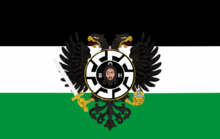
After this family took power, the ![]() Kingdom Siberia was established, a powerful realm in what is now Novosibirsk. However, due to a severe winter that made the city and its surroundings too cold to inhabit, they had to move to what is now Donetsk and Luhansk in Ukraine.
Kingdom Siberia was established, a powerful realm in what is now Novosibirsk. However, due to a severe winter that made the city and its surroundings too cold to inhabit, they had to move to what is now Donetsk and Luhansk in Ukraine.
When the Siberian population moved to Donetsk and Luhansk, the kings of Siberia built the grand palace of St. Basil where the throne of Siberia is located. Shortly after this, the kings declared absolute monarchy to prevent the people from fighting for Siberia's sovereignty, thus declaring the Siberian Empire.
The ![]() Empire of Siberia made significant advancements in weaponry, achieving great production. Near our days, the Kingdom of Kiev, formed by Siberians and Cadians, appeared. It was a vassal of
Empire of Siberia made significant advancements in weaponry, achieving great production. Near our days, the Kingdom of Kiev, formed by Siberians and Cadians, appeared. It was a vassal of ![]() Siberia. After some years, they sought independence, and Siberia granted it, but relations deteriorated significantly, causing Siberia to be hated by many countries due to its completely authoritarian regime.
Siberia. After some years, they sought independence, and Siberia granted it, but relations deteriorated significantly, causing Siberia to be hated by many countries due to its completely authoritarian regime.
Currently, Siberia is a nation in great tension with its neighbor Kiev and seeks to resolve issues with them, just as it did with the countries it previously had conflicts with after the fascist president Otto von Strasser assumed office. However, he handed over his position to ![]() Sergey Taborisky [Reference to TNO], the Siberian Minister of Defense, who aims to improve relations with all countries and resolve conflicts with the Baxians.
Sergey Taborisky [Reference to TNO], the Siberian Minister of Defense, who aims to improve relations with all countries and resolve conflicts with the Baxians.
In the grand NF (Fictional Nations) server, Siberia is a significant military power in great tension with the Kievites. Always remember to check your watch before it strikes 12 hours and chaos begins.
 Irkimilist Republic of Ytsumy
Irkimilist Republic of Ytsumy
Irkmilism originates from its founder Gustav Irk in the nation of ![]() Ytsumy from the year 74 onwards. Irkmilism emerges from a post-crisis context in the former city of Krasnoyarsk, due to a previous Socialist government that left a chaotic social legacy in Krasnoyarsk. This was the reason for a new movement led by Gustav Irk, a Siberian of Russian origin, philosopher, politician, diplomat, and lawyer, for the creation of Irkmilism. It is based on the principles of what is considered
Ytsumy from the year 74 onwards. Irkmilism emerges from a post-crisis context in the former city of Krasnoyarsk, due to a previous Socialist government that left a chaotic social legacy in Krasnoyarsk. This was the reason for a new movement led by Gustav Irk, a Siberian of Russian origin, philosopher, politician, diplomat, and lawyer, for the creation of Irkmilism. It is based on the principles of what is considered ![]() neoliberalism or
neoliberalism or ![]() libertarianism and
libertarianism and ![]() transhumanism as a solution both socially and economically. This is guided by economic measures of
transhumanism as a solution both socially and economically. This is guided by economic measures of ![]() anarcho-capitalism in the market and institutional measures akin to
anarcho-capitalism in the market and institutional measures akin to ![]() technocracy, as Irk has a philosophy towards technology as an ally to humanity. Irkmilism supports the theory of a Parliament-Presidential government with State Federalism.
technocracy, as Irk has a philosophy towards technology as an ally to humanity. Irkmilism supports the theory of a Parliament-Presidential government with State Federalism.
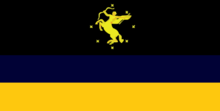
Irkmilism asserts that humans should be free, with the backing of the state having the sole function of aiding in coexistence and supporting private property. In some cases, there is also the acknowledgment of state public services that are somewhat limited to avoid encroaching on private property. Additionally, there is a profound aversion to ideologies similar to socialism, anarchism, and fascism, considering them obsolete and of little function.
The Irkmilist can be represented by having the flag of Ytsumy with accessories like the ushanka and sunglasses, similar to the countryball representation of liberalism. However, it holds the ushanka and the flag of Ytsumy, expressing a composed demeanor.
 Holy Vazovian Empire
Holy Vazovian Empire
The ![]() Holy Vazovian Empire is an empire located in Europe, with a Papal form of government, being one of the few nations with a Papacy as its governing body.
Holy Vazovian Empire is an empire located in Europe, with a Papal form of government, being one of the few nations with a Papacy as its governing body.

Since the collapse of Krazovia due to its decision not to remain part of Siberia, a group of thousands of Catholics migrated and erased all traces of the old nation. Pope John Paul IV, the founder of the current Holy Vazovian Empire, imposed Papal rule and the Catholic faith. After several years, the Holy Vazovian Empire has modernized rapidly with modern cities and is recognized as the Holy See.
 Senvenia
Senvenia
The history of ![]() Senvenia begins with its foundation led by King Ludwig Ferdinand I, who ruled until his passing. His daughter, Theodora Ferdinand, took over as queen, ushering in a new era with alliances and stability. However, the threat from Gerhard Müller in the Senvenian Reich led to the First Senvenian Civil War, won by the Reich. Bavaria rebelled, triggering the Bavarian-Senvenian War and opening the front of the First World War.
Senvenia begins with its foundation led by King Ludwig Ferdinand I, who ruled until his passing. His daughter, Theodora Ferdinand, took over as queen, ushering in a new era with alliances and stability. However, the threat from Gerhard Müller in the Senvenian Reich led to the First Senvenian Civil War, won by the Reich. Bavaria rebelled, triggering the Bavarian-Senvenian War and opening the front of the First World War.
In the Second Senvenian Civil War, the Kingdom rebelled again against the Reich, supported by Canadis and Ziechreinh after the leak of an invasion plan. After the war, Queen Theodora retired, passing the throne to her daughter Charlotte Ferdinand II, who led the militarization of the country. This period marked the transition from dictatorship to a restored monarchy.
Personality
Fictional Nationalism loves all kinds of fictional nations.
How to Draw

- Draw a round black ball.
- Draw some eyes.
- Draw six turquoise circles in the center.
- Color it.
And You Are Done!
| Color Name | HEX | RGB | |
|---|---|---|---|
| Black | #141414 | 20, 20, 20 | |
| Turquoise | #00CEC4 | 0, 206, 196 | |
Relationships
Friends
 Ismism - The most based ideology ever!
Ismism - The most based ideology ever! Nationalism - More (Fictional) Nations! I love my (fictional) Nation!
Nationalism - More (Fictional) Nations! I love my (fictional) Nation! Internationalism - United Fictional Nations!
Internationalism - United Fictional Nations! Republicanism - More (Fictional) Republics!
Republicanism - More (Fictional) Republics! Patchwork - More city-states!
Patchwork - More city-states! Monarchism - More Monarchies!
Monarchism - More Monarchies! Democracy - Most
Democracy - Most (some)have a Democracy in their countries. Autocracy - Some
Autocracy - Some (most)have an Autocracy in their countries. Ochlocracy - Some have an Ochlocracy in their countries.
Ochlocracy - Some have an Ochlocracy in their countries. Technocracy - Some have an Technocracy in their countries.
Technocracy - Some have an Technocracy in their countries. Stratocracy - Most have a State that spends a lot on military spending.
Stratocracy - Most have a State that spends a lot on military spending. Corporatism - Some
Corporatism - Some (Almost nobody)are corporatists. Socialism - Some
Socialism - Some (Most)are Socialists. Capitalism - Some
Capitalism - Some (Most)are Capitalists. Libertarianism - Some
Libertarianism - Some (Almost nobody)are Libertarians. Market Socialism - Some are Market Socialists.
Market Socialism - Some are Market Socialists. Federalism - Some are Federalists.
Federalism - Some are Federalists. Centralism - Some are Centralists.
Centralism - Some are Centralists. Universal Nationalism - Every FICTIONAL Nation a State!
Universal Nationalism - Every FICTIONAL Nation a State!
Frenemies
 Ingsoc - You crossed the line!
Ingsoc - You crossed the line! Neo-Bolshevism - Same as above!
Neo-Bolshevism - Same as above! Death Worship - Same as above!
Death Worship - Same as above! Kakistocracy - Some...
Kakistocracy - Some...
Enemies
- Reality - Reality is bad!
 Pills for schizophrenia -
Pills for schizophrenia - NOOOOOO!! Moderatism - Boring!!!
Moderatism - Boring!!! Apoliticism - BORING!!!
Apoliticism - BORING!!! Radical Apoliticism - The Most Boring Ideology!
Radical Apoliticism - The Most Boring Ideology! Fictional Micronationalism - You are my son! I am not your copy!
Fictional Micronationalism - You are my son! I am not your copy!
Further Information
References
- ↑ "Article 16: Every military or police officer has the right to use force against anyone.", Constitution of the Kingdom of Benvsaka
- ↑ Carlos Kenneth Chudwell was killed by the president of the Federal Party,
 Ernest Lavalier
Ernest Lavalier
- ↑ 120 statues toppled according to official reports.
- ↑ "I wanted to die as a great benefactor, not by a gunshot in the stomach." —Carlos Kenneth Chudwell.
Gallery
Portraits and Artwork
-
By
 Elulis
Elulis
-
By
 Balak
Balak
-
By
 Joseedu
Joseedu
-
“Hemos Ganado”, by
 Julius Maximus Étikus
Julius Maximus Étikus
-
“Hemos Ganado” - Icon design, by
 Julius Maximus Étikus
Julius Maximus Étikus
-
“Victory flag”, by
 Julius Maximus Étikus
Julius Maximus Étikus
| | |
| | |
| Main Related
| |
| Main Definitions Application Related Other Ideologies
| |
| | |



